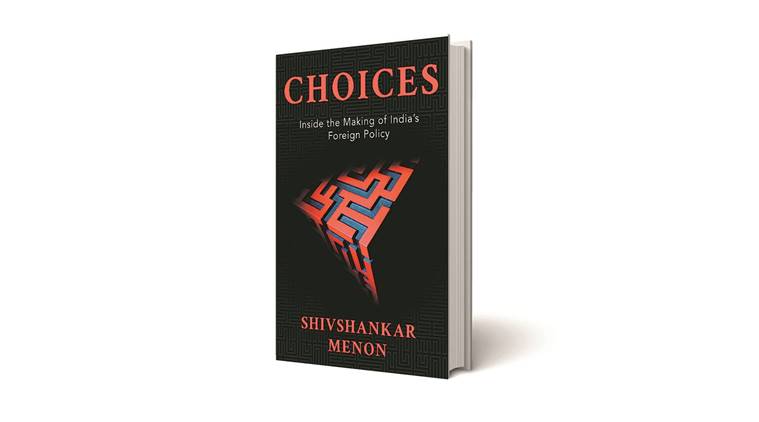Choices: by Shivshankar Menon
February 14, 2017 | Expert Insights
Should Professional diplomacy be measured by its’ ability to provide government with choices?
On 10 Feb 17, Shiv Shankar Menon, former National Security Advisor and former Foreign Secretary interacted with an august gathering at the Bangalore International Centre. He was hosted by eminent historian Ramachandra Guha, who engaged the former diplomat, with an array of engaging thoughts and interesting questions.
Why has there been no progress on theIndo-China Border Issue?
The former NSA said that contrary to popular perception, the Indo-China border was more peaceful than the Indo-Pakistan border and even the Indo-Bangladesh border. While he conceded that the Indo-China border had neither been delineated (on map) nor been demarcated (on ground) as an International border, considerable progress had been made in communicating each other’s perceptions.
In 1962, India suffered a humiliating defeat in the border war with China. In Menon’s opinion, the Indian approach to the border question is still hostage to a sense of betrayal. Even from the Chinese side, negotiations are now conducted by the Department of Border Affairs, who because of their limited mandate, do not see the dispute from a large-enough perspective. The border dispute has now not been settled for 55 years, positions have hardened and it is challenging for political leadership on either side, to settle the issue without a perceived loss, rather than a sense of gain. Any solution, necessarily has to be a compromise and a rhetorical campaign by media or the opposition, could spell serious trouble for political leadership, in either country.
However, India and China have completed 19 rounds of border negotiations, the last being in April 2016. Maps have been exchanged and areas of dispute & differing perceptions identified. In 1993, the Peace & Tranquility Agreement was signed and in 1996 it was further improved with the Confidence Building Measures (CBM) Agreement. Both sides recognize that there is more to India-China relations than the border dispute.
China is India’s largest trading partner and there are more than 10,000 Indian students pursuing studies in China. Both countries also collaborated, while negotiating WTO and Climate Change agreements. There are also joint military exercises and improved trade & travel links, between the two countries. However, there are quarrels over land and sea territory, international relations (particularly over Pakistan) and competition for natural resources. Since India and China together comprise more than 50% of the world’s population, we are perhaps more naturally competitors than collaborators.
Was the Indo-US Nuclear Deal such a big deal?
The Indo US Nuclear Deal of 2008, was symbolic of the removal of sanctions that had been imposed, after India’s nuclear test of May, 1998. It also gave recognition to India being a non-NPT compliant, nuclear-power state. More important it gave recognition to India’s impeccable record for non-proliferation, being a responsible nuclear power and a respected member in the comity of nations. In more explicit terms, it encouraged nations to see us differently from a neighbor, who had proliferated technology to both North Korea and Iran.
Are we too Pacifist in Dealing with Pakistan?
The former NSA articulated about the ‘Deep State’, within Pakistan. In the absence of strong institutions, there are many centers of power in modern Pakistan. Menon was confident that many responsible Pakistan appointments were unaware about the Mumbai attack of 2008. He opined that there are several power-groups within the Pakistan state, who would not like to see an improvement in Indo-Pak relations. Over a period of time, recurring patterns indicate that every time India-Pakistan relations appear ‘on the mend’ a provocative act is stage managed to set the effort back.
In his opinion, by staging the Mumbai attack, Pakistan had crossed the threshold and he had recommended both overt and covert retaliations. However, in retrospection he felt there was wisdom in India showing restraint; and holding back the overt response. Ramchandra Guha appeared to concur with India’s response, when he asked, ‘ Was this former PM Manmohan Singh’s finest hour in international diplomacy?’. Shiv Shankar Menon responded by saying it may be wiser to speak softly and carry a big stick.
In response to a query, Menon was candid to admit that in his opinion, independent India’s greatest diplomatic failure, was our inability to protect India’s interests with Pakistan.
Assessment
In the course of the evening, the former NSA discussed the India-China border dispute, India-US nuclear deal and India-Pakistan relations post the Mumbai Attack. In each case study, he outlined the choices before the government and lucidly discussed relative merits and disadvantages of each option. As a professional diplomat, providing rational choices is the epitome for professionalism. There is however a lingering uneasiness… In democratic India supported with professional bureaucrats, are our leaders being unfairly constrained to taking softer options? Does too much rationalism and analysis lead to executive paralysis?


